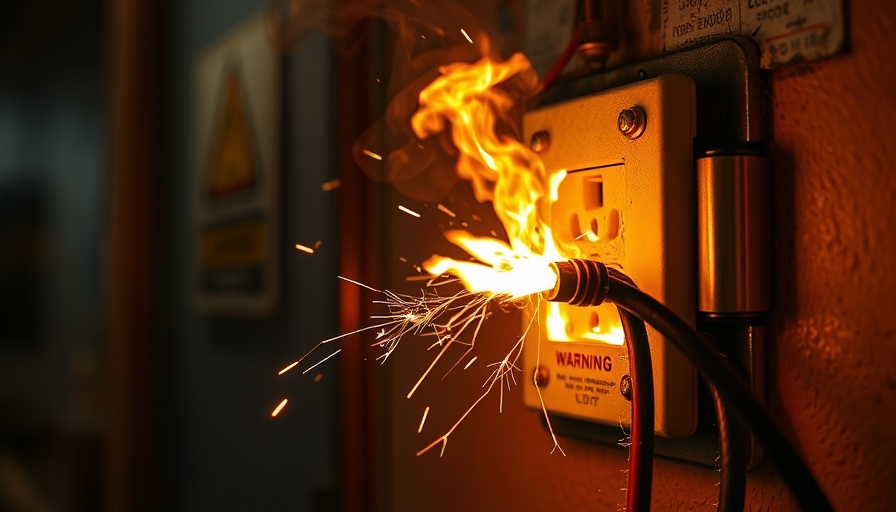
Understanding the Hidden Dangers: Common Electrical Hazards in Your Home
Electricity is the silent backbone of modern living. Facilitating our daily activities, it supports everything from the lights we turn on to the appliances that simplify our tasks. However, for many homeowners, including those in Maryland, the potential hazards linked to electrical systems often go unnoticed until tragedy strikes. Knowing common electrical hazards and how to prevent them is essential for ensuring a warm, inviting atmosphere free from surprises.
Spotting Faulty Wiring and Avoiding Overloads
One of the most significant causes of electrical fires is faulty wiring. Homes, particularly older ones, are prone to deteriorating electrical systems that can no longer handle contemporary power demands. Homeowners should look out for signs of trouble: frequent breaker trips, flickering lights, and any burning smells. To avoid such calamities, regular electrical inspections are vital, particularly for aging properties.
Furthermore, another prevalent issue is overloaded circuits, which occur when too many devices draw power from a single outlet. This not only risks overheating but can also lead to dangerous situations. To prevent this hazard, homeowners must distribute electrical loads evenly and avoid relying on extension cords as a permanent solution. Instead, consider upgrading the wiring to meet today's standards—it enhances both safety and efficiency.
The Importance of Upgrading Electrical Panels
Electrical panels serve as the command center for your home's electrical system, and outdated panels can lead to overheating and fires due to their inability to handle increased usage. If your home’s panel frequently trips breakers or looks worn, an upgrade might be in order. Hiring a qualified electrician for a thorough inspection ensures safe energy distribution and introduces modern safeguards like surge protection, greatly reducing the risk of damage to appliances.
How to Use Extension Cords Safely
While extension cords can provide temporary relief for our power needs, improper use poses serious hazards. Many homeowners unknowingly use these cords as permanent solutions, increasing the likelihood of overheating. Running cords beneath carpets may also expose live wires and become a fire hazard. The best practice is to limit extension cord usage to short-term applications—install additional outlets where high electricity consumption is expected. Always choose cords rated for their intended use and keep them free from damage.
Avoiding Overloaded Power Strips
Power strips can be lifesavers, but misuse can quickly turn them into liability hazards. Plugging high-wattage devices—like space heaters or microwaves—into power strips can lead to substantial risks. Homeowners should understand the electrical limits of these strips and strive to plug appliances directly into wall outlets whenever possible. Opting for power strips with built-in surge protection can help safeguard your devices and reduce fire risks.
Water and Electricity: A Dangerous Mix
Never forget that water and electricity do not mix. High-risk areas like bathrooms, kitchens, and outdoor spaces present the most danger. Appliances should be kept away from wet zones to avoid electrocution; for instance, a hairdryer near a sink is a recipe for disaster. Installing Ground Fault Circuit Interrupters (GFCIs) in moisture-prone areas is a lifesaving step as these outlets shut off power when water is detected, offering critical protection. Homeowners can further minimize risks by ensuring that their hands are dry before using switches and regularly checking appliances.
Taking Action Against Defective Appliances
Many households have appliances that are far past their prime, which can lead to electrical malfunctions. Defective or recalled devices often pose significant dangers, from overheating to electrocution. Regularly checking the safety ratings and recalls of appliances can protect your home. Keeping a close watch on the condition of cords and ensuring appliances don’t show signs of wear will go a long way in safeguarding your loved ones.
Why Awareness Matters: A Lifesaving Insight
Understanding these common hazards and implementing preventative measures not only fosters a safer home environment but can also save lives. With mindfulness and safety practices in place, families in Maryland can rest assured that they’ve taken steps to minimize risks. It's an investment in peace of mind that is well worth making.
As awareness grows, so does community engagement in creating safer homes. Share experiences, tips, and advice with friends and family to further spread the importance of electrical safety within your community. Let's work together to ensure our homes are the safest they can be!
Final Thoughts: A Call to Action
Taking proactive measures against electrical hazards is crucial. Schedule a professional electrical inspection today to ensure your home remains a safe haven. Remember, knowledge and action are powerful tools in creating a warm and welcoming home.
 Add Row
Add Row 
 Add Element
Add Element 


Write A Comment